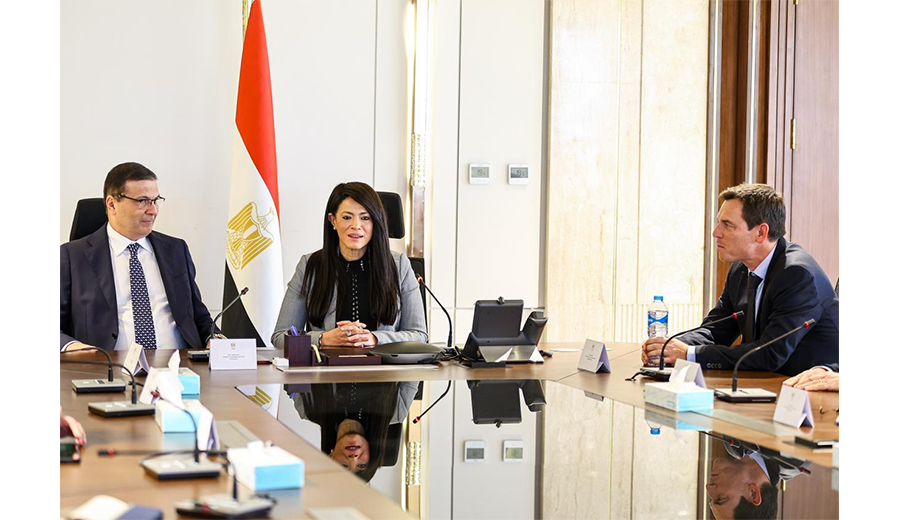Planning Minister presents her ministry's current policies and future agendas before Egypt's parliament

08 February 2021
The inflation rate decreased to 5.7% on 19/2020, it achieved its lowest level in 14 years, and the poverty rate decreased for the first time since 1999: says Hala El-Said
EGP 104 billion is the volume of government investments directed to the governorates of Upper Egypt during 18 / 2019-20 / 2021: says Hala El-Said
Egypt’s Minister of Planning and Economic Development Dr. Hala El-Said delivered on Monday a statement of the ministry's performance before the plenary session of the Parliament headed by Counselor Hanafi Jabali, Speaker of Parliament.
During her speech, El-Said reviewed the steps and achievements made by the Ministry of Planning and Economic Development during the past period on several pillars. The first is the Public Investment Department.
El-Said explained that the ministry has
attached utmost importance to directing the investment plan towards the government's
work priorities to improve the quality of life of citizens and raise the level
of services, by focusing on sectors that stimulate economic growth and provides
decent work opportunities.
El-Said indicated that public investments
increased by 66% during 18/2019-20/2021 compared to the previous three years,
and this resulted in the implementation of many development initiatives,
including “A Decent Life” presidential and the survival boats initiatives.
In the field of health, the initiative of
doubling the intensive care beds and first aid points was launched, in addition
to increasing the rates of nurseries.
In
the field of education, El-Said noted that the initiative to reduce the density
of classes and link technical education outputs to the labor market by
establishing technical applied schools and technological universities has been
launched.
Several other development initiatives and
projects have also been launched, including the National Project for Lining and
Rehabilitation of Canals, which is considered one of the labor-intensive
projects with positive economic, social and environmental impact.
Dr. Hala El-Said pointed out the ministry’s
keenness to direct public investments towards developing the infrastructure,
especially the sectors of “transport, drinking water and sanitation, and
electricity services,” due to its essential impact on improving the quality of
life of citizens and attracting more local and foreign private investments.
El-Said indicated that public investments
directed to these sectors during 18 / 2019-20 / 2021 amounted to about EGP 500
billion, achieving a growth of 20% compared to the three years preceding it,
and constituting 32% of public investments.
El-Said continued that, during the years
18/2019 and 19/2020, these investments resulted in the completion of 416
projects in the electricity sector, for EGP 95.6 billion, and 689 projects in
the housing sector for EGP 72.6 billion, which resulted in the rate of
sanitation coverage reaching 96 % in cities and about 37.5% in villages, 145
projects in the transport sector for EGP 33.2 billion, 37 projects in the
petroleum sector for EGP 431 billion pounds, which resulted in achieving
self-sufficiency in natural gas, and 458 projects in the water resources and
irrigation sector for EGP 5.6 billion, in addition to 20 projects in the
agricultural sector, for EGP 4.3 billion.
El-Said pointed to an improvement in
Egypt's competitiveness globally in many indicators, as the infrastructure
quality index improved by 48 ranks, to Egypt ranked 52nd in the world in 2019
compared to the 100 positions in 2015/14, and in the road quality index with 90
places, Egypt ranks 28th in the world and in electricity quality in 44 centers,
ranking 77th globally.
El-Said stressed the ministry’s consideration
of directing public investments towards sectors that support human development,
especially in the sectors of "health and education", as public
investments directed to these sectors during 18 / 2019-20 / 2021 amounted to
about EGP 150 billion, achieving a growth of 170% compared to three years that
preceded it.
These investments resulted in, during the
years 18/2019 and 19/2020, the implementation of 1650 projects in the
pre-university education sector, the creation, development, and expansion of
more than 26,500 classrooms in all educational levels, the provision of
education services in many of the neediest villages.
It also resulted in the targeting of
increasing the number of private universities to 15, and the establishment of 9
new technological universities whose outputs are linked to the labor market to
reach a coverage rate of up to 33% at the level of the governorates of Egypt.
These investments also led to the
establishment and development of 120 hospitals and health units, to increase
the number of childcare beds in hospitals by 87% and the number of intensive
care beds increased by 77%.
El-Said also asserted that the volume of government investments
directed to the governorates of Upper Egypt during 18 / 2019-20 / 2021 reached
about EGP 104 billion, with a growth rate of about 27%, compared to the three
years that preceded it.
“Recent years have witnessed an increase in
the per capita share of public investment by about 265% compared to 2015/14,
and the years from 17/2018 to 20/2021 witnessed a remarkable development in the
per capita share of local administration investments, with an increase of
195%,”. El-Said explained.
Dr. Hala El-Said added that a growth rate
of 5.6% has been achieved in the first half of 19/2020, before the impact of the
repercussions of the Coronavirus.
“Despite
the crisis, the Egyptian economy achieved a growth rate of 3.6% during 19/2020,
as Egypt came within a limited number of countries that achieved positive
growth in light of the pandemic, and it was planned to achieve a growth rate of
5.8% in the year 20/2020 and 6% in 20/2021,” El-Said said.
She also pointed out that the unemployment
rate decreased to 7.3% in the first quarter of 20/2021, compared to 9.6% in the
fourth quarter of 19/2020, and the annual unemployment rate decreased from 13%
in 2014 to 7.9% in 2019.
El-Said
highlighted that the inflation rate also decreased to 5.7% on 19/2020, its
lowest level in 14 years, after it recorded 13.9% in 18/2019, and about 33% in
the year 17/2018.
“This is one of the fruits of the serious
reform steps taken by the Egyptian state. Since November 2016, this has
strengthened the Egyptian economy and its ability to face crises,” El-Said
asserted.
During her speech, El-Said confirmed the
decrease in the poverty rate for the first time since 1999 to 29.7% compared to
32.5% in 2017/2018, as the poverty rate decreased in all regions.
“The decline was greatest in the rural
Lower Egypt by 4.73%, followed by the Upper Egypt countryside 3.79%,.” El-Said
concluded.









